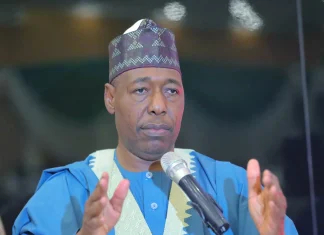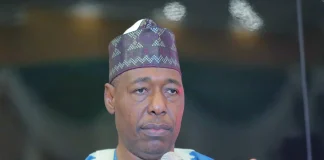By Lasisi Olagunju Ph.D
“The president stands down next week. He said sometime last year that he had done well and history would be kind to him: “I want [Nigerians] to analyse how things were when we came in and how they are when we’re leaving.” Today, he insists he has done very well. But, history has no friend and no fixed address. Its judgement comes now or maybe, later. Just as I write this, a BBC report popped up online. Its headline: ‘Nigeria’s Muhammadu Buhari leaves legacy of kidnapping, inflation and debt’. And the report’s conclusion: “The fact is that Nigerians were safer, better off and less in debt before Mr Buhari took over, and many will remember him for presiding over the toughest eight years they might ever face.”
Exactly one week from today, Muhammadu Buhari will stop being our president; his place another shall take. But what kind of leader has he been? The best assessment of a leader you get, not from his fanatics – boys who eat directly from the leader’s palm – but from men with cocks that crow as his. I take Babatunde Fashola as the gold witness here. Fashola has been Buhari’s Minister of Works and Housing for eight years and was Bola Tinubu’s Chief of Staff in Lagos for four years. He is, therefore, very qualified to do a character assessment of the two reigning sharers of Nigeria. And he did it so well on Channels Television on April 17 this year – just last month. I don’t know how many of us noticed how deeply the man did it: Hear Fashola: “I was speaking to someone and I said, imagine there are two football coaches… Buhari is the type of president of a ‘football coach’ that will prepare his team and then go and sit in the coach’s dugout and watch them play for 90 minutes. He trusts them to do well and believes there’s nothing he can do. Asiwaju (Tinubu) would be the kind of coach playing the game (from the dugout) with his men. One coach delegates completely; the other delegates and stays with you. Each one has his strength.”
Why would Fashola say “each one has his strength”? What is the strength of absentee presence, present in absentia? It is too late to invite American economist and politician, Dick Armey, to come and repeat his famous statement that “three groups spend other people’s money: children, thieves, politicians. All three need supervision.” Someone said even if it was not late to give the counsel, the man who leads the government here won’t have the time to listen; he would delegate the listening. A leader definitely needs others to get to where he wants to be. That fact, however, does not share a meaning with abdication of responsibilities. A leader abdicates his position when he shares tasks to subordinates without supervision and monitoring and without going back to ask whether the delivery was ever made. A leader leads by not sleeping on duty, by not giving his people’s onions to small grubs of the field. It is not competence to fire the shot and think the job is done. My people say when you shoot a deer, make sure you follow the blood trail; if you don’t track it, the game becomes food for maggots. Where is the sense in planting without weeding? Unwanted, invasive plants will ensure that no meaningful harvest comes from that soil. That is why the grains of Buhari’s eight years are fewer than the chaff – and it is tragic.
Governments are cults. Our outgoing government is not the cabal we were programmed to call it. It is a cult of contradictions – deep and shallow; dark and red with shades of white. Toyin Falola called a cult the ‘Club of Sixteen’. The one in the professor’s story meets in the clouds but it is still not as dark as government. Governments are secret creators, secret keepers and secret killers. But unlike the cult of the earth that lives forever, this one born of pretentious democracy has a lifespan. It must die and it dies at the sight of its successor. We are in that season of elegies for receding powers. Another cult will take over next week. Forget it that the old and the new are sired in the same grove, they must do the ritual (the oro) of regime change; the evil of their greed ensures that politicians fight in the marketplace for women to see their nakedness. You do not have to commune with the gods to know how cults clash. You are seeing it already in Mattawale of Lagos and Bawa of Daura exchanging fists of accusations.
On June 9, 2015, a Senate president and a speaker were to be elected. A security chief rushed to Defence House, Maitama, Abuja, to inform the brand new president that his order for the National Assembly to be cordoned off had been carried out. The host appeared shocked and surprised. Who asked the man to do it? The man told the president who did. The president’s face stiffened. He gave no such order! He raised his voice as he said “You take your orders directly from me. Okay?” Embarrassed, the visitor said “Yes, sir”, saluted his Commander-in-Chief and left to quickly stand down his men. That security chief told this story to someone who told me the very week it happened. The person had no reason to lie. The incident was an early warning that the new government was going to suffer power usurpation from mini-cults, inside and outside. The incident also appeared to be the beginning of a chain of events that have not ended almost eight years after.
The president is a General who enjoys the powers and privileges the epaulets on his shoulders confer. And, the lucky old man has enjoyed every bit of the small and big chops served in the endless party for eight years. But what kind of leader really is the man and how well has he watched the back of the people who gave him the key into the hall of fame?
In days as these, literature provides a ring of forts for the bard. I run to William Shakespeare for guidance and insights in repeated times. How does it feel to put someone on the throne and then, that someone now uses that position to torment the electors? Apart from the class in power, I do not know any other Nigerian whose stocks have not suffered grave depreciation under this scorching sun going down in the West. For eight years, the leader abandoned the led; he even ditched the knights who won the crown for him. Remember Oluremi Tinubu in February 2018 complained aloud that her husband had been thrashed by those he helped to power: “He was campaigning, I did too. We were running three campaigns in my house. And for him to be trashed like that?…Occasionally, I would chip in and I would say, ‘You’re still helping out? Why are you helping out?’…” The drama in Oluremi’s outburst takes me back to Shakespeare. Read about “rebellion, treachery and shifting alliances” in his Henry IV; the forced abdication of the throne by Richard II for Henry Bolingbroke to become King Henry IV, and the regrets of a key ally of the new king who laments the error of putting “down Richard, that sweet lovely rose” to “plant this thorn, this canker, Bolingbroke.” (Part 1, Act 1, Scene 3).
We all remember Buhari’s long walk to power. “After going to the court so many times to challenge results of elections in 2003, 2007 and 2011, and going up to the Supreme Court, I concluded that ultimately it is God who determines who will win elections, and in 2015 I got here,” the outgoing president told a gathering of his party men in Daura in May 2018. His snail ultimately reached the top of the tree but what has he done with that feat? The poet, Niyi Osundare, in a recent poem, asks duck why his “frantic craving for the river” when he knew he lacked the power to swim: “Fierce and frequent was/His quest for that Crown/He crawled, caviled cajoled, cried in countless bids/Till a mongrel coalition rewarded his frenzy.” Then, the poet notes, incompetence proceeded to wed corruption, clan wrestled down competence, tribe triumphed over truth, square pegs sneaked into round holes “and the nation grabs the reverse gear/and speeds, break-neck, into medieval darkness.” Who would issue a rebuttal to this and say the poet lied? Who?
Every home has felt the meaning of “from better to worst.” Those lucky to be alive pant under the weight of the cost of life and of living. A bag of rice moved from N7,000 to N45,000; the price of a loaf of bread took giant steps forward and is not looking back forever. Bandits banded with Boko Haram to wreck the North while the South got kidnapped by pampered scoundrels. But from today till Wednesday, T.V stations will intubate us with documentaries of Buhari’s strides in his eight years. Our president will exit power next week with songs of victory. His fist is beating his chest that under his watch food is cheaper and life is better. He won’t ever agree that the locusts have had a free rein and life has been nasty, brutish and devastatingly short. And, the story could have been positive if the leader had found time to be patient and listen and had supervised his appointees. But everything is lost to the arrogance of fateful aloofness. He chose his track and there were enough warnings that the road taken would lead to no harvest. The warners were called wailers. Regime bell-bearers rang repeatedly that their Caesar could do no wrong; the leader felt so too and flaunted the magic wand of his body language. But, it is not enough for a leader to have faith in himself. Shakespeare’s Julius Caesar is a man of great discernment but he is to soon fall on the sword of his arrogance and impetuousness. He rashly alienates allies and surrounds himself with himself, alone. He listens not to the sense in others; he pays no heed to his wife and the warnings in her dream; he ignores, and even insults, the soothsayer who comes repeatedly with warnings on the dangers of the Ides of March. The emperor is very sure of his own invincibility and says he is more dangerous than even danger: “Danger knows full well that Caesar is more dangerous than he. We are two lions litter’d in one day, and I the elder and more terrible” (Act 11, Scene 11).
Leaders who are bigger than the law will ultimately wreck the land. When a people are in trouble, what they need most is a leadership that knows the way and believes in order. They are lost forever if all the leader wants is power and not the responsibilities that come with it. Read the character called Jack in William Golding’s Lord of the Flies. Jack is the young man who grows from likability to the very opposite of that noble word. He is the one who loses an election and goes sad, sour and savage. Jack is the strong-willed leader who has no problem making rules but has every problem obeying the rules. When his counterforce, Raph, tells him the danger of breaking the rules, he dismisses him: “The rules!” shouted Ralph. “You’re breaking the rules!” “Who cares?”, he sneered. The rules are made for others, not for him. And, because of him, help is delayed, disastrously, for the whole group. Lord of the Flies is the tragic story of a group of school boys marooned on an island after a plane crash. They start life as peaceful, adorable boys seeking rescue from the deserted tropical island. They soon become savage and cruel to each other; then a pig’s head covered in flies becomes their god unto whom they look for deliverance; they call it the ‘Lord of the Flies’. We worship pigs here too; dead pigs covered in flies.
The president stands down next week. He said sometime last year that he had done well and history would be kind to him: “I want [Nigerians] to analyse how things were when we came in and how they are when we’re leaving.” Today, he insists he has done very well. But, history has no friend and no fixed address. Its judgement comes now or maybe, later. Just as I write this, a BBC report popped up online. Its headline: ‘Nigeria’s Muhammadu Buhari leaves legacy of kidnapping, inflation and debt’. And the report’s conclusion: “The fact is that Nigerians were safer, better off and less in debt before Mr Buhari took over, and many will remember him for presiding over the toughest eight years they might ever face.”
Share your story or advertise with us: Whatsapp: +2347068606071 Email: info@newspotng.com















